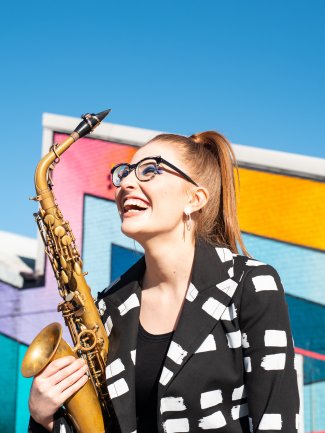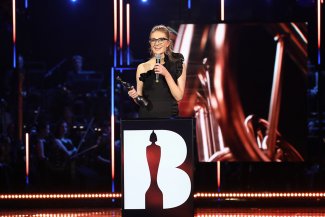
Jess Gillam: ‘Responsibilities of young musicians’
10/1/2020
Jess Gillam explains why young performers have a duty to pass on their musical passions through music education work and why we should value music more in our culture
One of the best ways to engage young children in music is to play to them and for them to experience live music. There’s nothing like it. I’ve had incredible responses when I’ve performed to children. Recently, I played to 300 seven-year-olds and told them to react however they felt the music, and that they didn’t have to sit quietly. By the end of the piece they were all up on their feet dancing and clapping. Seeing that instinctive reaction to music is amazing.
Children have an intuitive reaction at a young age, but then music is often not incorporated into the mainstream curriculum in any way. It’s seen as an add-on in schools and is side-lined early on. To me it should be an integral part of any education.
Music one of the most demanding subjects and there is so much to take from it, aside from the mechanics of learning an instrument. It can enrich so many other parts of a child’s life, teaching them cooperation, resilience, determination, communication and interaction. The fact that it’s side-lined affects how creatively children can think, which has an impact upon every other subject area. That’s why music should be a core subject within the curriculum.
Free music and instrumental tuition should also be available for every child, and even for adults who haven’t been exposed to music at a young age. I meet so many older people who say they’d love to be able to play an instrument and I always tell them that it’s never too late to learn.

I feel we don’t value music enough in our society – it’s around us everywhere and we use it at every occasion, but we don’t always talk about it or value it. I would love to encourage people to go to more concerts.
Young performers have a duty to make sure that the next generation has music in their lives. This can be through us going into schools and being involved on a practical level, or it can be through speaking about it and trying to promote music education. I think sometimes we also need to create a more welcoming atmosphere in concerts.
The first concert I remember was a saxophone quartet my parents took me to when I was about 11. It was magnetic. I’d never heard a saxophone sound like that and was completely blown away. That’s when I started playing saxophone more seriously. Until then I was playing pop tunes, but at that point I decided I wanted to be the best I could be and started studying more seriously.
One of the most important things I’ve learnt is that once you take away all the traditions that surround music, it is just a form of communication. My ambition with every single performance, recording and concert is to move someone, whether that be to bring them some joy, feel any kind of emotion, or make them question something. My role is to communicate through a language that is more universal than any other language we have, and to do that as well as I can.



